Does centenary of First World War bring prophesies of World War III?
Jul 24th, 2014 | By Randall White | Category: Countries of the World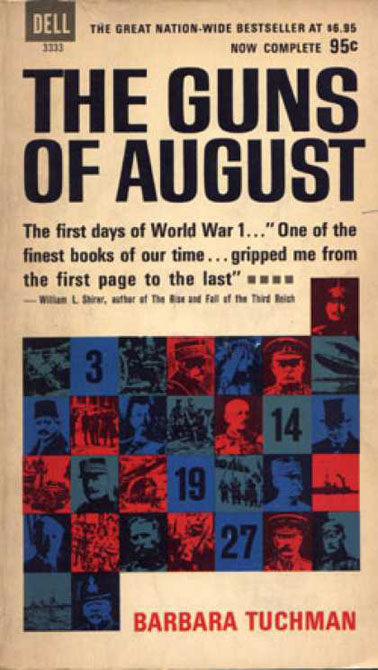 [UPDATED JULY 27, 28]. Maybe it’s just the summer heat going to my head (tho it hasn’t been all that hot where I am). But lately I’ve been thinking about how we are now just over a week away from the 100th birthday of The Guns of August that started the First World War.
[UPDATED JULY 27, 28]. Maybe it’s just the summer heat going to my head (tho it hasn’t been all that hot where I am). But lately I’ve been thinking about how we are now just over a week away from the 100th birthday of The Guns of August that started the First World War.
On June 28, 1914 Archduke Franz Ferdinand, heir to the throne of the Austro-Hungarian empire, was assassinated in Sarajevo, Bosnia. Austria-Hungary declared war on Serbia a month later. And this set off a malevolent sequence of falling diplomatic dominoes, culminating with Germany’s declaration of war on Russia on August 1, Germany’s declaration of war on France on August 3, and Germany’s invasion of Belgium and Great Britain’s declaration of war on Germany on August 4.
Here in Canada, in northern North America, on the still rather colonial conventions of the day, when Great Britain declared war it did so on behalf of the global empire on which the sun still never set. And this meant that the first self-governing British dominion of Canada was at war too. As if to clarify the point, in Ottawa on August 5, 1914 HRH Prince Arthur, the Duke of Connaught (third son of Queen Victoria, and first member of the Royal Family to be appointed Governor General of Canada, by the British imperial government across the sea in those days), simply announced that Canada was now at war with Germany too.
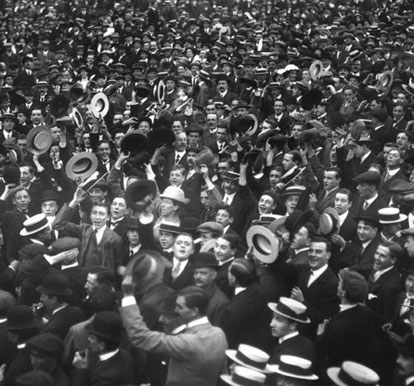
London crowds cheer British declaration of war on Germany in Trafalgar Square, Tuesday, August 4, 1914.
On August 4, 1914 in Washington President Wilson had announced that the United States of America would remain neutral in the conflict. And the splendidly isolated Wilson administration remained neutral for another two years and eight months.
Then (as the US Department of State Office of the Historian puts it nowadays) : “On April 2, 1917, President Woodrow Wilson went before a joint session of Congress to request a declaration of war against Germany. Wilson cited Germany’s violation of its pledge to suspend unrestricted submarine warfare in the North Atlantic and the Mediterranean, and its attempts to entice Mexico into an alliance against the United States, as his reasons for declaring war. On April 4, 1917, the US Senate voted in support of the measure to declare war on Germany. The House concurred two days later.”
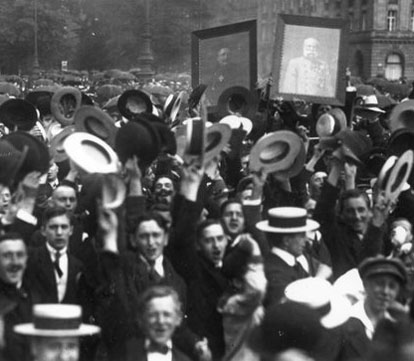
Crowds cheer announcement of German war with Britain on Unter den Linden, a boulevard in the Mitte district of Berlin, Tuesday, August 4, 1914.
Now, a century later, in the middle of the summer of 2014, with turmoil in the Middle East and Eastern Europe freshly haunting the daily news, there are those who say that the centenary of the outbreak of the First World War is finding us in all too similar conditions. They have been saying such things since the start of the year. As in, eg :
*5 JAN 2014 – “Is it 1914 all over again? We are in danger of repeating the mistakes that started WWI, says a leading historian … ‘While history does not repeat itself precisely, the Middle East today bears a worrying resemblance to the Balkans then’” …
* 22 MAR 2014 – “Margaret MacMillan: How today is like the period before the First World War” …

The war arrives in Canada – outside the “Star office”(in Montreal, it seems clear enough), midnight, August 4th, 1914. Britain had just officially declared war against Germany. And on the still rather colonial conventions of the day, this meant that the first self-governing British dominion of Canada was at war too. “Canadians gathered in the streets, singing and cheering. Everyone wanted to be a hero and everyone wanted to go to war.”
* 15 APR 2014 – “EDWARD LUCAS: I hope I’m wrong but historians may look back and say this was the start of World War III … ‘Vladimir Putin is striking at the heart of the West’”…
* 21 JUL 2014 – “Why is the West idly watching the world burn? … Will the tragic downing of Malaysia Airlines Flight 17 finally be enough to force the Western powers to grapple with the conflict in Ukraine?”
So … Is it true, even just maybe? Is the latest annoying conflict between Israel and Hamas, side by side with the Malaysia Airlines Flight MH17 disaster in eastern Urkraine, about to set some long-smouldering political and economic tinder ablaze, and jump-start us into World War III at last? Like it or not, and even if (like the early globalizing Westerners of 1914) we too are captives of a dubious “belief that a full-scale war between the major powers is unthinkable”????
UPDATE JULY 27, 2014 : Here are eight more recent articles on the two main issues covered in the original posting: (1) JUL 25 : 11:11 AM ET – “Moscow refutes Washington’s ‘innuendos,’ says US shares blame for E. Ukraine crisis.” ; (2) JUL 25 : 5:20 PM PT/8:20 PM ET – “Israel, Hamas agree to 12-hour humanitarian truce in Gaza … But Israel rejected a proposal by the United States and United Nations for a seven-day truce” ;Â (3) JUL 25 : 7:49 PM / 7:52 PM ET – “Ukraine crisis: Russia firing artillery at Ukraine troops, US says …Â Moscow claims US is lying, says Ukraine firing across border into Russian village” ; (4) JUL 25 : 8:36 PM / 11:28PM ET – “Why Hamas is winning the war” (by Patrick M<artin in Jerusalem) … “The conflict has also exposed rifts in Israel. Gangs shouting ‘Death to Arabs’ and ‘Death to Leftists’ broke up a peaceful protest against Israel’s war in Gaza last Saturday night in Tel Aviv’s Habima Square …” ; (5) JUL 26 : 5:50 AM / 5:30 PM ET – “Gaza conflict: Hamas rejects ceasefire extension …Israel’s security cabinet approves extending ceasefire until midnight local time on Sunday”… ; (6) JUL 26 : 9:10 AM / 2:29 PM ET – “Malaysia Airlines Flight MH17: RCMP officer heads to aid Dutch investigation … Officer will head to Netherlands Sunday, Minister of National Defence Rob Nicholson says” ; (7) JUL 26 : 12:13 PM / 11:36 PM – “Ukraine crisis: Government forces attempt to retake key town … Horlikva has been held by pro-Russia rebels for months” ; (8) JUL 27 : 2:01 AM ET– “Israel slams Kerry for handling of Gaza crisis … Israel claims US gave in to Hamas demands via Qatar and Turkey.”
UPDATE JULY 28, 2014 : Here are two more articles on the two main issues covered in the original posting: (1) JUL 28 :Â 12:35 AMÂ / 12:04 PM ET – “Gaza conflict: Israel says Palestinian rocket misfire hit al-Shifa hospital … UN’s Ban Ki-moon urges both sides to begin talks to ‘break the endless, senseless cycle’ of violence” ; (2) JUL 28 :Â 3:17 AM / 12:02 PM ET – “Malaysia Airlines MH17: Police team turns back from Ukraine crash site … Plane suffered massive decompression after shrapnel hit, black boxes show.”
1. Israel and Palestine in the Middle East … interesting, but not really crucial for world peace ????
 The lesser of the two allegedly big pots on the “Western” foreign policy high-tech stove, in the middle of the summer of 2014, is the current turbulence in Israel, over Hamas rockets from Gaza and so forth. To the dismay of many on all sides, the still quite conservative government of Israel has now more or less invaded Gaza, to deal with the issue.
The lesser of the two allegedly big pots on the “Western” foreign policy high-tech stove, in the middle of the summer of 2014, is the current turbulence in Israel, over Hamas rockets from Gaza and so forth. To the dismay of many on all sides, the still quite conservative government of Israel has now more or less invaded Gaza, to deal with the issue.
Meanwhile, the Egyptian government (such as it may be these days) and US Secretary of State John Kerry are trying to help prevent this ever-lingering conflict, among fewer people than currently live in the what the Government of Ontario calls the Greater Golden Horseshoe, here in central Canada, from getting altogether out of hand.
Recent headlines suggest the state of the story as I write: “Kerry arrives in Israel to push for Gaza cease-fire” ; “Gaza conflict: Air Canada, FAA extend Tel Aviv flight ban … US secretary of state in Tel Aviv says ‘still work to be done’ to broker truce” ; “No breakthroughs as Kerry joins talks for Gaza cease-fire” ; “Gaza conflict: Israeli military confirms soldier missing …Â Kerry, UN chief try to negotiate a ceasefire as Hamas and allies fire a barrage of rockets into Israel.”
Based on all past history of this conflict – which no doubt did begin in earnest with the inevitably imperfect arrangements for the State of Israel when it was admitted to the United Nations by the General Assembly on 11 May 1949, it is extremely easy to be sceptical about the prospects of any immediate plan for Israeli-Palestinian peace. Both the Hamas version of Palestine and the current Netanyahu version of Israel are going overboard right now. And there may well be no way of really changing their mutually dysfunctional policies in the short term.
Some kind of respite in the sheer killing ought to be possible, however, and it is a credit to the Obama administration in the United States that John Kerry is working as hard as he is to do something constructive on this front. (And, again, to the Egyptians with all the obvious qualifications.) It also seems to me important to continue to stress the ultimate room for agreement about the longer-term future among Jews and Arabs (and others) in Israel and Palestine – beyond the narrow circles of both the terrorist Hamas and the militarist conservative radicals who continue to guide the present Israeli ship of state.

Rabbi Shaul David Judelman (l.) and Palestinian farmer Ziad Abed Sabateen, in Bethlehem. They want to create an organic farm in the West Bank as a project for peace. “Sabateen is comfortable with the idea of Jews living in a Palestinian state, just as there are Arabs that live in Israel.” And “Judelman wouldn't reject a political solution that would allow Jewish settlers to vote in Israel and pay taxes to a Palestinian state.”
It is sadly true that the Israeli-Palestinian conflict in the Middle East also has wider implications for many other parts of the “West” today (whatever exactly that may or may not mean). See, eg, “Hardline Muslims tried to impose Islam in British city’s schools: government report” ; “Fears of French Gaza spillover grow after ‘anti-semitic’ riot in Paris suburb.”Yet if we the emerging free and democratic people of the global village today (and our leaders, of course, of course) do allow all the various trouble spots in the Middle East during this summer of 2014 to escalate into some kind of Third World War at last, then we will surely go down in what human history remains as one of the stupidest generations ever to walk Planet Earth. Even when compared with the less than brilliant generation that blundered into the big surprise of the First World War.
2. Threats for (and from?) the West from (and to?) Vladimir Putin’s Russia …
The ongoing conflicts between pro and anti Russian forces inside today’s independent Ukraine, so to speak (or pro Russian and pro European forces?), have been cast into bold relief by the Malaysia Airlines Flight MH17 disaster.
The tragedy of an ordinary passenger airplane being shot from the sky by some sloppy military outfit (almost certainly by mistake?) is altogether outrageous. And it was disturbing to learn, in the initial wave of Flight MH17 media coverage, that such disasters are not exactly uncommon or unprecedented in what now pass for modern times. (See, eg, Ishaan Tharoor’s “The terrible history of passenger planes getting shot out of the sky” in The Washington Post. Rachel Maddow’s MSNBC show on US TV was also very good on this subject.)
What is the current state of the investigatory art? According to the Canadian Broadcasting Corporation website : “Senior US intelligence officials said Tuesday [July 22] that Russia was responsible for ‘creating the conditions’ that led to the shooting down of the plane, but they offered no evidence of direct Russian government involvement … The intelligence officials were cautious in their assessment, noting that while the Russians have been arming separatists in eastern Ukraine, the US had no direct evidence that the missile used to shoot down the passenger jet came from Russia” …
The CBC site goes on : “The plane was likely shot down by an SA-11 surface-to-air missile fired by Russian-backed separatists in eastern Ukraine, the intelligence officials said, citing intercepts, satellite photos and social media postings by separatists, some of which have been authenticated by US experts … But the officials said they did not know who fired the missile or whether any Russian operatives were present at the missile launch … Despite the fuzziness of some details, however, the intelligence officials said the case that the separatists were responsible for shooting down the plane was solid. Other scenarios – such as that the Ukrainian military shot down the plane – are implausible, they said. No Ukrainian surface-to-air missile system was in range.”
* * * *
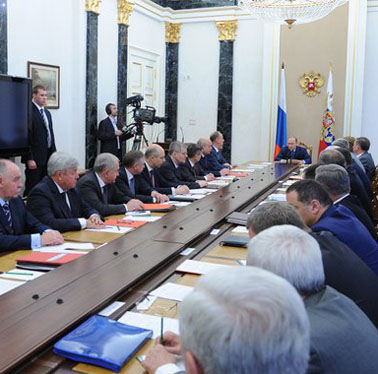
Russian Security Council meeting. July 22, 2014. Photo: the Presidential Press and Information Office.
As an example of just how difficult it can be to figure out what all this means for the bigger picture of potential non-progress toward some approximation of World War III, Russian President Vladimir Putin also presented an intriguing document to his domestic Security Council this past Tuesday, July 22. This was quickly and only somewhat differently reported on in two general Reuters pieces : “MH17: Putin vows to sway Ukraine rebels to allow investigation” ; and “Putin says will use influence on Ukraine rebels, denounces West.”
The same Russian Security Council document was then almost as quickly taken as a key source for two quite different interpretations of just what is going on in Russia, and especially in the mind of the man who we in the West see as its present Supreme Leader, Vladimir Putin.
As understood by Fred Weir in the Christian Science Monitor piece, “Did Putin just bring Russia in from the cold?,” c 5PM Tue 22 Jul 14 : “In a security meeting today, Putin said Russia would try to rein in Ukraine’s rebels. He also effectively told media and politicians that the country is not under Western siege –Â and to stop repeating that claim … Russian experts say that Putin’s sudden reversal is a clear sign he is looking to ratchet down the domestic anxieties and anti-Western attitudes that have been rife since the Ukraine crisis erupted about five months ago. And perhaps most significantly, it’s time to end the siege mentality.”
Largely based on the same document, it seems (and only about 10 hours later) Mark MacKinnon posted “Why Putin can’t back down now” on the Toronto Globe and Mail website. And in Mr. MacKinnon’s view : “Indeed, rather than acknowledging his weakening position and stepping away from his unsavoury allies in eastern Ukraine, Mr. Putin emerged from a much-anticipated meeting of his Security Council sounding as if he was preparing instead for an arms race against the NATO military alliance … .”
Personally, I hope that Fred Weir is right in his more positive interpretation here, and Mark MacKinnon is wrong in his more negative (and some might even say “realist”) understanding. And I think there is at least some plausible evidence for the ultimate triumph of Mr. Weir’s more positive point of view in the actual July 22, 2014 Russian Security Council document.
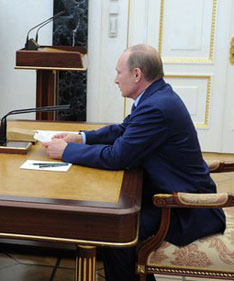
Vladimir Putin at the Security Council meeting, July 22, 2014. Photo: the Presidential Press and Information Office.
To me Mark MacKinnon seems to almost have forgotten these lines uttered by Russian President Vladimir Putin at the beginning of the document : “I should make it clear from the start that, obviously, there is no direct military threat to the sovereignty and territorial integrity of this country. Primarily, the strategic balance of forces in the world guarantees this … As for the terrible tragedy that occurred in the sky above Donetsk — we would like once again to express our condolences to the families of the victims; it is a terrible tragedy. Russia will do everything within its power to ensure a proper comprehensive and transparent investigation.” I agree that anyone who goes around riding horses bare chested bears watching. But the Vladimir Putin who talks about “the strategic balance of forces in the world” at least doesn’t quite sound to me like someone who is going to start World War III any time soon.
3. The wisdom of the US president is guiding us wisely, along with others around the world : a contrarian view of Barack Obama in the summer of 2014
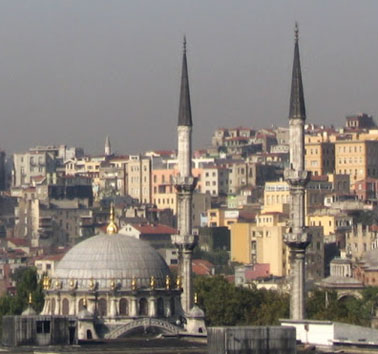
Istanbul 2007 – the year before Barack Obama was elected President of the United States. And started at least some new understandings in American foreign policy.
I confess that I often enough see less encouraging headlines about the Russia-Ukraine issue. (Eg : an earlier “Russia challenges accusations that Ukraine rebels shot down airliner” ; and the much more recent “Ukraine says missiles from Russia may have shot down 2 military jets.”)
But then I see other headlines. And some of them even remind me that the ongoing foreign policy debate in the United States today is not always as absurdly partisan and mindlessly ideological as it sometimes seems. (Eg : “Ron Paul Defends Russia After Malaysian Plane Crash” ; and “Hillary vs. Rand Paul race would mess with conventional minds.”)
In a similar spirit I feel driven to quickly note that I am getting increasingly fed up with all the mindless foreign (and other) policy criticism of President Barack Obama. He is not perfect. Who is, ever? I think he is almost certainly too much like a (necessarily careful and cautious) Canadian politician, to win over the mood of John Wayne that sometimes seizes especially the Southern United States. (Bill Maher nicely raised this John Wayne point on I think his show from Los Angeles last Friday.)
To me in any case Barack Obama remains the best and most sensible president the United States has had for some time. He keeps telling us that there are no easy answers to the difficult questions in such global hotspots as Israel/Palestine and East Ukraine. And I remain convinced he’s right. It is a widespread and obstinately foolish insistence on easy answers to difficult questions that finally leads to such increasingly deadly and disastrously foolish human projects as world wars. Leaders like Vladimir Putin inflame things, from time to time. And some people especially find that exciting – and think it somehow shows strength. Then leaders like Barack Obama come along and calm things down. I think calm-things-down is the kind of leadership we need in the summer of 2014. And “we” ought to be happier than we seem to be (at least in President Obama’s own home and native land), that this is happily the kind of leadership we have.
4. Canadian coda … reviving Lester Pearson’s peacekeeping tradition in the 21st century?
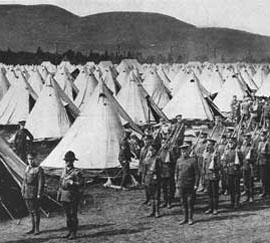
The initial Canadian recruits for the First World War were gathered and given basic training at a hastily-built camp at Valcartier, Québec. On October 3, 1914 the first 32,000 -strong contingent of the Canadian Expeditionary Force sailed for Britain.
What about Canada in all this – those of us who live here might reasonably ask? Well, to start with, Prime Minister Stephen Harper is of course no Barack Obama. (Though after pretending to be some kind of strange ideologue at the start, Mr. Harper has deftly enough settled into his own variation on the theme of the traditional careful and cautious Canadian politician.)
For one thing, as is often enough wisely observed, Stephen Harper’s brand of Canadian foreign policy is largely for domestic consumption. The Harper government is a bold advocate for both Israeli and Ukrainian nationalism in an effort to placate and even please two strategic voting blocks in the Canadian electorate today.
At the same time, the Harper government foreign policy might also be reduced pretty close to some trite formula like Speak Loudly and Carry No Stick. (For one thing Sticks cost a lot of money that might otherwise be used to cut voters’ taxes.)Â And something of all this seeps through in such recent headlines as “Putin has ‘let slip the dogs of war,’ Baird says as Canada mulls further sanctions against Russia” and “Canada to expedite new sanctions against Russia.” (UPDATE: And see esp, from July 26 :Â “Ukraine crisis: John Baird says no ‘blank cheques’ …Â Foreign affairs minister reacts to complaints from Ukraine ambassador that Canada hasn’t delivered on promises.”)
I have found it intriguing as well, as I skimmed through diverse international sources to see what others in other places think of prospects for World War III, to stumble across a link to a blog piece called “Canada Is Selling Arms to Everyone It Can” on the Times of India website just a few days ago. The piece was written by one Ben Makuch and first posted on May 17, 2014.
(It should be noted that this is still Canada, and the “Arms” involved include “advanced combat helmets” made by a firm in Montreal, with a branch plant in Vermont, for the US and Danish militaries, and “drones” for the US, Saudi, and Canadian militaries, made in Waterloo, Ontario.)
Anyone who has made it this far in all this excessive mid-summer rambling will be pleased to hear that I have just two final remarks on this last branch of the subject at hand.
First, one thing seems beguilingly clear about East Ukraine and Gaza right now. In both cases some kind of effective international peacekeeping force on the ground could probably make a considerable humanitarian contribution to suppressing at least the immediate tragic violence. There are no doubt vast difficulties in all this. But an updated revival of Lester Pearson’s old Canadian peacekeeping tradition – which arguably started with his Nobel Prize winning intervention in the Suez Crisis of 1956 – might actually promote an early 21st century Canadian foreign policy that was of at least some use beyond various narrow worlds of Canadian domestic politics (as important as Canadian domestic politics of course can be, in many other ways!).
Second, I altogether agree with something that the Canadian career diplomat, Paul Heinbecker, wrote this past Canada Day, in the Toronto Globe and Mail. It was in a piece called “The monarchy hurts Canada’s standing in the world. Its time to let go.” And the piece began, “Fealty to the British monarchy is an anachronism and a drag on Canadian foreign policy that confuses many and delivers little.”

Canadian republican baby talks on telephone at tender age. Can Prince George do this? Isn’t someone who can more of a real prince of the people? The kind of prince (or princess) that any baby can be. Not just one who was born to rule but no longer does anything really, etc??
I think the imminent centenary of the start of the First World War in August 1914 ought to make us think as well about the importance of all this for any useful Canadian foreign policy today. And I couldn’t help but be amused by the recent CBC website posting, rather foolishly headlined “Prince George turns 1: ‘Republican slayer’ PR gold for Royal Family … Third in line to the throne has become media magnet and trendsetter.”
Really? Those deep thinkers at the CBC who seriously think a spoiled baby from another country offshore, nowhere near as interesting or exceptional as most contemporary Canadian babies I know of myself, will somehow slay the rising Canadian republican dragon in Canada today ought to take Paul Heinbecker to lunch. And ask him what Canada can finally do, in the global quest to stop World War III!


Tatum for Prime Minister!